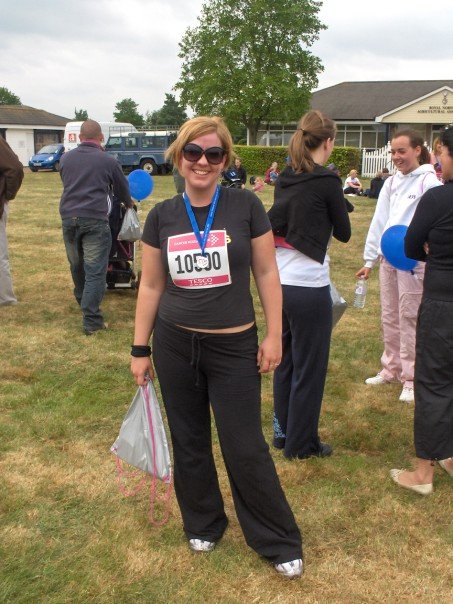Why don’t Women play sport more?
That’s a question that gets bandied around a fair bit. Every now and then someone like Helen Grant will pop up and suggest the answer is more money spent on sports that allow Girls to be “pretty”. Or introducing Zumba in schools rather than making them do all those nasty unfeminine sports like hockey and cross country running.
When I read these things I get angry. Like a real, deep down, makes me want to cry because it’s all so ingrained I can’t change it kind of angry.
I’m 38 years old this year and I’m pretty fit. I run, not super fast, but I run. I go to the gym 2-3 times a week and I use the big weights, not the machines, and I play Roller Derby, a full contact sport, in a competitive team.
But I haven’t been active my whole life.
In fact, it wasn’t till I was about 33 that I started to really get involved properly in being active, learn that exercise was about more than losing weight and looking “toned”, and find a real joy in being able to use my body to actually do stuff.
Recently I’ve started thinking about why that is, and looking back on my history with sports and fitness. In today’s post I thought I’d have a little look back on my own personal history as a woman in sports. I’ve actually split this into 2 parts as I was heading for about 3000 words, and frankly no one has the patience for that.
Today I’m going to talk about the years when I didn’t do any sport, and why that was.
Please do tell me your stories in the comments, I would really love to hear them!
Just to make myself look like a liar, actually, when you go right back to when I was a child, I WAS pretty active. I was in the gymnastics club, I went to a dance club, I did athletics at school and I enjoyed it. I bloody hated netball, but you can’t have everything I guess, and I was never entirely sure what the point of cross country running was, as we were just packed off out of the school grounds and left to wander back in our own time.
When I think back, I think the first real issue I remember having with sport was that I never really knew what I was doing. Did someone explain the rules of Netball to me but I wasn’t listening? When we set off on cross-country running I don’t remember ever being told how far I was running, or being given a time that I could work towards.

Random photo of me as a kid. That’s me in spotty top.
I enjoyed athletics because someone would tell me how high, or how far I jumped or I was racing against others over short distances and there was an obvious goal. In dance and gymnastics the goal was to achieve set moves and do them well.
But most sports were a bit of a mystery, I never remember actually keeping any score when we played netball, or being given any indication of whether what I was doing was right, so I had no sense of achievement. It all seemed very arbitrary.
the first real issue I remember having with sport was that I never really knew what I was doing.
Gradually, I also remember getting the distinct feeling that sports weren’t for people like me. There was the girl at my gymnastics club who laughed at my yellow leotard. The teacher at my primary school who took our whole year on an outing to play Cricket, and then wouldn’t let me play because I was asthmatic and insisted I just sit in the shade all day being very, very bored. The P.E. teachers that stuck me in the outfield as far away from any action as possible during rounders games so I couldn’t do any harm.
By the age of 10 I remember feeling fat and dumpy and ungraceful. Sports were for outdoorsy, shiny faced girls with swingy pony tails. I felt like there was some secret code to being involved in these things that I hadn’t been let in the secret of and that everyone was secretly laughing at me because I had the wrong dance shoes, or the wrong leotard and I started to become very aware that my body just didn’t fit the “sporty” mould.
I had always liked to read, and I did well at school, so I decided obviously I was an intellectual, and they weren’t supposed to run around getting sweaty.
For that matter GIRLS weren’t supposed to run around getting sweaty.
I liked to play with make-up and dolls and I liked pretty shiny shoes and the girls that were good at sport didn’t. So I couldn’t be good at sport, and if I couldn’t be good at it there was no point.
I started to feel that I just wasn’t very good and these things, and doing them because I enjoyed them wasn’t really encouraged. In fact if I wasn’t good at them, how could I possibly enjoy them?
So I stopped.
No one seemed to mind. From the age of around 14 my participation in any kind of sport was sporadic. I tried to avoid any team sports based P.E. lessons at school, though I still enjoyed dance and gymnastics, and was briefly given a chance to do trampolining, which was awesome. Once I left school the opportunity to be involved in anything at all past the age of 16 just wasn’t there, and I guess I felt it didn’t really matter.
Whilst the boys would kick about playing football, and there were 5-a-side clubs and other places to play, there just wasn’t anything for girls aged over 16 unless you wanted to attend an aerobics class or a self defence class.
From magazines like Just 17, that I started reading at about 12, I learned that exercise was a punishment to make up for eating too much and that I should run up and down the stairs 50 times to burn off the calories from one apple. So I did that.
I learned short body weight exercise routines that were supposed to give me toned arms. I did Callanetics from a book my Mum had and learned that the way to measure progress was to take photos and to focus on how my body looked.
Sports were for outdoorsy, shiny faced girls with swingy pony tails.
By the time I was at University the only way I really thought of exercise and activity was in relation to diet and weight loss. I joined a gym for a bit and I did the exercises prescribed on the little card they gave me, but they were pretty boring and not very challenging and I had no idea how I was supposed to progress them.
I took up running for a bit in my early 20s and started to enjoy it. In the days before activity trackers I would go out and run a set route, some days I would try and run it faster than before. I liked it, but I got tired of feeling embarrassed and self conscious and being shouted at while I ran. So I stopped doing that too.
In my mid to late 20s I took part in a couple of Race for Life races. I loved getting a medal and a goodie bag, but it all just seemed a bit, “blah”. I wasn’t necessarily looking for a female bonding activity. I wanted to be challenged, but at the time I didn’t really know that.

My second Race for Life in 2007. It took me about 37 minutes. I had no idea whether that was good, bad, or average.
I’m a very competitive person, but for most of my life I’ve felt like that’s a bad thing. It led to me giving up a lot of stuff that I wasn’t immediately good at, because no one helped me channel that competitiveness into a drive to be better.
I genuinely didn’t know that sport and activity could be about feeling like you were getting faster, or stronger, or the pride in learning a new skill. Exercise was about looking pretty in a frock and being skinny. Considering how sweaty and gross you get while you’re doing it, it didn’t really seem worth the effort when you can get skinny by doing Slim Fast diets instead. I started to take pride in being the kind of woman with a wardrobe full of stilettos and not a single pair of trainers.
And that’s how I ended up at 30 in the place that most Women do. In a round of exercise DVDs, bodyweight routines from magazines and run-walking Race for Life 5ks in an attempt to lose weight and be “toned”.
I sometimes feel quite sad now when I look back at the years I wasted when I could have been doing something that I could have loved. I feel angry that there wasn’t more encouragement at school to be competitive with myself, rather than others, to improve, to learn new things and think of exercise as something other than a punishment or something new to be bad at.
I would like to think that things had changed, but all the indications are that they really haven’t.
If you made it this far, well done. Honestly, now I’m in my 30s I’m in a good place with all this stuff. So I promise I’ll be back soon with the other side of the story!
I would love to hear your stories with school sports and post school sports. Have you always been active? Are you active now? Why, or why not?
11 comments for “Women in Sport: My Story, the Early Years.”